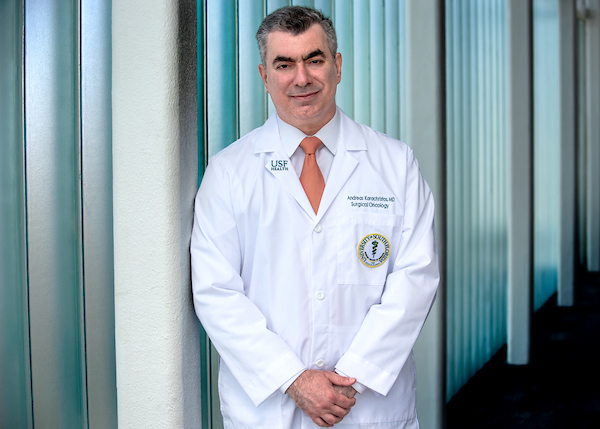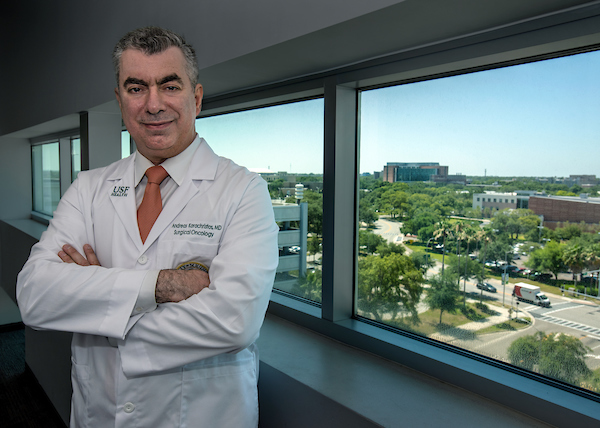For all his accomplishments, Andreas Karachristos, MD, prides himself on being available to his patients via his cell phone number 24-7.
This open and accessible approach helps patients at one of their most intense moments of their lives, said Dr. Karachristos, professor of surgery and chief of the Division of Surgical Oncology in the USF Health Morsani College of Medicine.
“A cancer diagnosis is commonly overwhelming. I help patients understand every detail of their care, so patients can make the most informed decisions,” he said. “There are lots of options in cancer care now: radiation therapy, chemotherapy, immunotherapy and surgery. Cancer tumors of the pancreas and liver can be aggressive and challenging to treat.”

Dr. Andreas Karachristos
Dr. Karachristos joins USF Health specializing in hepato-pancreato-biliary(HPB) or the care of the liver, pancreas, bile duct and gallbladder. Prior to USF Health, Dr. Karachristos directed the liver program at the Fox Chase Cancer Center, an NCI Comprehensive Cancer Center and before that he was the chief of HBP Surgery at Temple University in Philadelphia.
He is a nationally respected specialist who speaks at conferences about liver and pancreatic cancer treatment, was rated Top Doctor by Philadelphia Magazine in 2018, and is well published in medical journals and books.
“We are fortunate to have Dr. Karachristos join USF Health. Cancer of the liver and pancreas are very serious conditions. Dr. Karachristos will bring extensive training and experience caring for patients with the most advanced cancer treatments. His dedication to patient care and research is unmatched,” said Dr. Paul Kuo, professor and chair of Department of Surgery in the USF Health Morsani College of Medicine.
Specialized Cancer Care and Research
Dr. Karachristos provides comprehensive care of benign and malignant tumors of the liver, pancreas, and bile ducts through open surgical approaches as well as minimally invasive approaches, such as laparoscopic and robotic surgery. He specializes in complex vascular reconstructions after major resections.
His research is focused on enhancing liver recovery after major resections and neoadjuvant therapy in pancreatic cancer.
In treating pancreatic cancer patients, he believes that patients who have chemotherapy prior to surgery tolerate their treatment better overall.
“New research indicates that the survival of pancreatic cancer might be tied to this approach,” he said, but he was careful to note, “That it is not definite yet.”
Another research interest is how to enable patients to have a stronger recovery after a major resection or removal of part of the liver.
“There is always a small risk of liver failure after major liver resections. We are constantly looking at how to improve recovery and outcomes after a major resections,” he said. “We are looking into reducing injury and inflammation to the remaining liver.”
Progress in Cancer Care
“The future of cancer care is individualized care. We hope that the advancements in genetics and molecular oncology will give us the tools to treat every patient in a specific way instead of a one size fits all approach,” Dr. Karachristos said. “Advancement in basic science will aid in the development of better tests and early markers. This will help us diagnosis cancer earlier and, more importantly, make treatments more patient specific.”

Dr. Andreas Karachristos
Multidisciplinary Team
At USF Health, Dr. Karachristos works closely with a multidisciplinary team of medical and radiation oncologists, pathologists, radiologists, surgeons, nutritionists and psychologists to provide the most comprehensive care to patients.
”I work closely with extremely talented USF surgeons caring for tumors of the GI tract, esophagus, stomach, colon, and rectum,” Dr. Karachristos said. “USF Health has health care navigators to help patients coordinate their surgical and non-surgical care with multiple specialists. In addition, USF Health has a team of very accomplished basic scientists and we are eager to collaborate.
“We are fortunate to have a team that provides excellent surgical critical care that is essential to managing complex surgical patients. Our patients greatly benefit from being treated at a large tertiary care center such as Tampa General Hospital. Multiple specialists, including our highly specialized gastroenterology team are readily available to treat the most complex patients. We also have access to advanced technology such as surgical robots. Patients who have surgery performed with a robot typically experience less pain and recover quicker.”
Approach to Patient Care
Dr. Karachristos’ philosophy is to take the extra time to help patients feel comfortable and have a good understanding of their care.
“I take the time to explain all relevant details and help the patient to choose the best therapy tailored to their specific needs” he said. “I try to make it easier for them. I am highly engaged with my patients. I have a special relationship with them. I’m available to speak with patients at any time.”
To care for patients diagnosed with cancer, Dr. Karachristos brings extensive specialized training to USF Health. In 2005, Dr. Karachristos completed his general surgery residency at Temple University Hospital in Philadelphia. He followed his residency with a transplant and hepatobiliary fellowship at University of Cincinnati in 2007.
He returned to Temple University and was promoted to Professor and Chief of HBP Surgery. In 2012, Dr. Karachristos joined the Fox Chase Cancer Center and promoted to Professor of Surgery and Director of the Liver program.
“We appreciate Dr. Karachristos’ commitment to his patients and multi-disciplinary, comprehensive care. He is a great addition to the USF Health team and will contribute every day to Making Life Better,” said Dr. Kuo.
Story by Kathleen Rogers, photos by Allison Long, USF Health Communications and Marketing.
